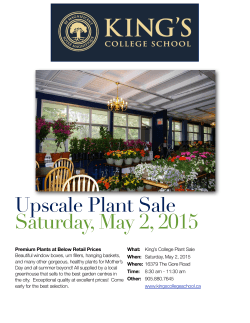
Project Report from FY14
Project Title: Sustainable Greenhouse Management Project Leader: Tina Smith Project Overview According to the USDA New England Agricultural Statistics, nursery and greenhouse production was ranked first among the state's agricultural commodities in 2012 with sales estimated at $156,300 million. According to a 2009 survey, conducted by the New England Nursery Association there are more than 5,130 firms that are involved in production (nurseries, greenhouses, herbs, cut flowers, turfgrass) retail (garden centers, florists) and landscape services. About half of these operations combined these different business elements. The industry consists of wholesale growers and grower retailers, including a rising number of diversified farms that are adding greenhouse crops to their businesses strategies. Plant production is also the basis for many associated horticultural industries such as plant and seed propagators, product suppliers and service industries. These companies together have significant economic and environmental impacts for Massachusetts. Sustainable greenhouse management requires solutions to problems of energy, pest management, trained labor, water quality, production practices and plant nutrition for a diverse range of crops and complex agricultural and environmental issues. As Massachusetts undergoes cultural, economic and climatic changes, both new and established growers will need to learn to use practices that are economically, environmentally and socially sustainable. The Sustainable Greenhouse Management project will undertake applied research and educational opportunities to address key problems and opportunities facing the industry and the public. Programs on greenhouse crop production, integrated pest management, water and nutrient management, waste management and energy will be delivered through a variety of newsletters, websites and message board, publications, workshops, conferences, training programs, diagnostic services and applied research. Applied research considers organic growing media and fertilizers for ornamental greenhouse crops. Activity Summary Applied Research on organic growing media and fertilizers for ornamental greenhouse crops Educational Publications: Revised New England Greenhouse Floriculture Guide and gardening fact sheets Educational workshops and conferences on sustainable greenhouse crop production for growers, and garden retailers Web-based educational materials for sustainable greenhouse crop production Total Educational Contacts In Person Indirect Contacts (Print, Web, etc…) Adult Contacts 648 935,236 Youth Contacts --- Narrative Summary and Impact Sustainable greenhouse production addressed the following important issues: Maintaining economic viability for the floriculture and greenhouse industries and enhancing environmental sustainability, (greenhouse cultural practices, integrated pest management, organic production, water and energy conservation and exotic diseases, insects and invasives). Programs addressing these issues were delivered through a variety of educational opportunities including workshops and conferences, grower site visits, newsletters, electronic media including two websites and facebook and diagnostic services. Activities included: grower consultations; educational workshops and conferences, articles, publications and newsletters (Floral Notes and Mayflower - 300 growers) and information on websites www.negreenhouseupdate.info - message update – 30,000 users (36,512 sessions) per year, www.umass.edu/umext/floriculture - 925,598 sessions (740,811 users per year) and YouTube videos on a variety of greenhouse production subjects were viewed by 17,000. Based on workshop evaluations, as a result of the Extension Greenhouse Crops and Floriculture program activities, 20 growers are better able to diagnose diseases using on-site test kits 55 growers learned about managing aphids, thrips and mites in greenhouses and how to better use plant growth regulators and used that information to make important business decisions for 2014, 45 growers intend to use learned information regarding biological control in their greenhouses. Over 100 growers collected information and talked one-on-one with Extension staff exhibiting information at trade show. The New England Greenhouse update message assisted 700 growers, industry representatives and staff at other Universities in non-chemical management of pests via email pest messages. Forty growers received oneto-one assistance with diagnosing a problem with their greenhouse crop and followed advice. One hundred thirty eight growers earned pesticide recertification credit. Collaborating Organizations Massachusetts Department of Agricultural Resources Massachusetts Flower Growers Association New England Floriculture, Inc.
© Copyright 2025










